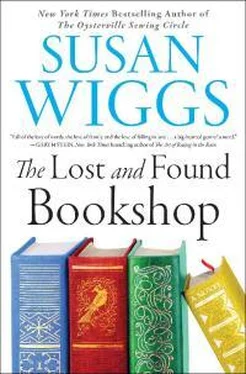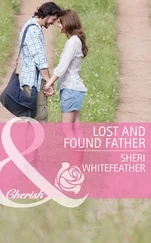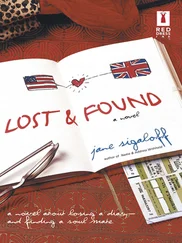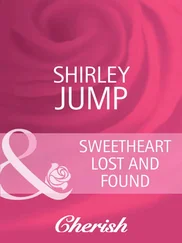“I hear he’s very popular, but I’ve never read his books.”
Dorothy gasped. “He’s the best! I’ve read all his books at least three times.” Her blue eyes brightened as she selected a book from the shelf. “This one!” She held it up in triumph. “I checked this out from the library and kept it until it was overdue, and now I want my own copy.”
Watching the eager child, Natalie had a strange sense of déjà vu. She herself had spent hours in that spot, browsing through books and sometimes agonizing about what to pick. Like an ephemeral breeze, she felt the presence of her mother, who never influenced her choices. Sometimes you have to let the right book find you , Mom used to say.
“What do you love about these books?” Natalie asked.
“Everything! See, they’re called the Flip Side Stories because watch.” Dorothy demonstrated. The front of the book became the back and vice versa. “There are actually two stories in every book. It’s the same story, only told from two different characters. You read one, and then you flip it over and it tells the other side of the story.”
The titles were simple and straightforward— Cat and Mouse. Rich Kid, Poor Kid. Class Clown, Class Brain. Geek and Jock.
“Well, that’s ingenious,” Natalie said. “I can see why you like these books. I’ll have to read some of them right away.”
“You should! I bet you’d like Jack and the Giant .” Dorothy handed her a copy. “Everybody thinks the giant is bad, but when you read what he’s really like—well, I won’t spoil it for you.”
Natalie opened the book, and her gaze fell on the inner flap of the cover, which featured the author’s photo. Trevor Dashwood had perfectly sculpted cheekbones, a glorious tousle of hair, a crisp white shirt, and an intriguing, slightly mischievous grin. Either he was the best-looking author she’d ever seen, or this picture was his greatest work of fiction.
His brief bio offered tantalizing details—homeschooled in Northern California, attended Oxford University through a program for exceptionally creative students, avid book collector, founder of a nonprofit fund to help children dealing with addicted parents, winner of the Prix de la Croix in France. The bio concluded, “Mr. Dashwood lives on the California coast near San Francisco.”
“I’ll start tonight,” Natalie said. “He sounds like a wonderful person.”
Dorothy hugged Big Sister, Little Sister to her chest. “I’m getting this one.” She jumped up and went to the counter.
“Are you a big sister? Or a little sister?”
“Nope,” said Dorothy. “But maybe soon.”
“You’ll still have enough left on the gift card to get something else if you want,” Natalie told her after showing her the total.
“Oh, good! Sometimes I read a book too fast and then I panic because I need another one right away.”
“I can relate,” said Natalie. “Would you like a suggestion?”
“Sure!”
Natalie went back to the children’s nook and selected a book her mother had specially highlighted with a handwritten card. “ Wedgie and Gizmo ,” Natalie said. “I like their names.”
“Me too.” Dorothy studied the bright, whimsical cover. “It looks really good. Do I have enough to get this one, too?”
“I think you’re in luck.” Natalie rang up the purchase, and for a moment, it was like old times. A delightful customer, delighted with her purchases. A sale completed. Natalie took extra care, putting the little girl’s books in a bag, adding a bit of swag—a bookmark with the shop’s slogan and a pin that said Read All Night .
“Here you go,” Natalie said. “You’re all set.”
“Thank you.”
Grandy came into the shop from the back. He had his cane in one hand and a yellow writing pad in the other. “Is that Dorothy I hear?” he asked.
“Hiya, Mr. Harper!” She favored him with her gap-toothed grin. She was like a cartoon character come to life.
Natalie was gratified by the delighted expression on her grandfather’s face. “You two know each other, then.”
“Dorothy’s a regular,” said Grandy. He indicated the writing pad. “Blythe and I have been working on the story of the bookstore, and we must remember to mention how important our young customers are.”
Natalie felt a sinking sense of guilt. She was going to have to spoil the ending of that story. Soon, probably.
Dorothy held up her bag. “I got two books today.”
“Lucky you. And look what I found.” He rummaged in the pocket of his trousers and pulled out a handful of round glass-topped typewriter keys.
She peered at them. “Cool.”
“Here, take the D and the G—your initials.”
Natalie was encouraged that Grandy had recognized the kid, even knew her initials. Her mom had said the dementia seemed to ebb and flow, unpredictable and arbitrary. Today might be a good day. She hoped it was.
“Really? Thanks!”
“I have plenty left over from my old typewriter shop,” Grandy told her. “That’s what this place was before it was a bookshop. I thought it would always be a typewriter shop, but the business went into decline. That means it was failing because of the modern world.”
“Good thing you turned it into a bookstore,” Dorothy said.
He nodded. “Blythe and I started it with a treasure we discovered in the basement—a box of antique books. And that was how the Lost and Found Bookshop got its start.” His brow furrowed. “The business is in trouble again because of the modern world. People are watching nonsense on their phones and ordering books online. If that keeps up, places like this might cease to exist.”
Apparently, he did have some understanding of the difficulties her mother had been having.
Dorothy’s face drained of color. “No,” she said. “Bookstores are magic.”
“I must write that down.” Grandy shuffled to the small desk behind the counter. “We can all use a bit of magic. Enjoy those books, young lady.”
“I will.”
“Is someone picking you up?” Natalie asked her. “Your mom, or . . . ?”
“I have to walk to my mom’s office on the corner. She works at Century Financial Services.”
“All right. I hope you come back soon.”
“Okeydokey. Bye!” The girl left with a spring in her step.
After she was gone, a quiet air settled over the shop. It was not a welcome quiet. Natalie wanted a bustle of readers coming and going. Things picked up around midday, starting with a panhandler who shuffled in with a tattered backpack and layers of unwashed clothes. He helped himself to a cookie from the café area, and Natalie didn’t say anything. Then, to her surprise, he bought a used copy of Bastard Out of Carolina , meticulously counting out his cash from a threadbare billfold.
Several regular customers dropped by to offer condolences. A couple of them bought books.
“I’m sorry for your loss,” said one woman, selecting a vegan cookbook. “The bookstore won’t be the same without Blythe.”
Natalie contemplated the mess her mother had left behind. She liked to hope she would never be so irresponsible with her finances . . . yet her mom had been happy, as far as Natalie could tell. She lived for the shop, and although it had pounded her into debt, she had been beloved and connected in ways that had nothing to do with security.
Natalie wasn’t sure she had the nerve to embrace that kind of risk.
She nodded with a tremulous smile at the sympathetic woman. What Natalie didn’t want to tell customers was something that was becoming increasingly, depressingly clear. Without Blythe, the bookstore would cease to exist at all.
6
“You can’t sell the shop,” the lawyer said. “Not the building or the business or its assets.”
Читать дальше












